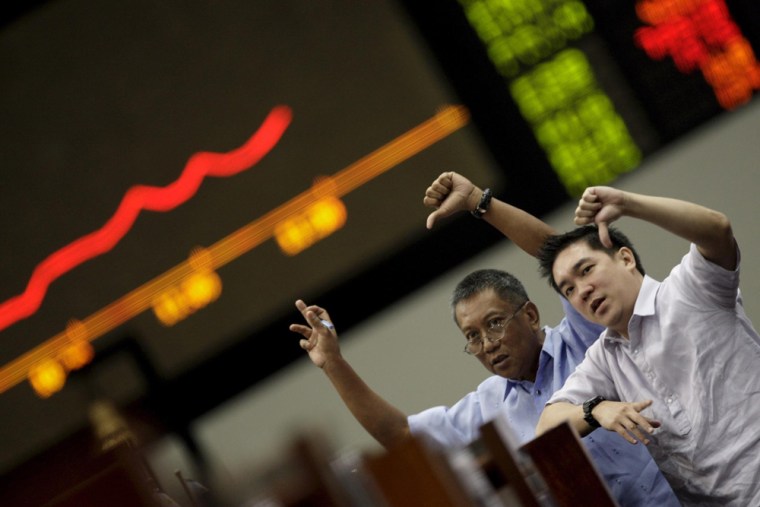World stock markets swooned again Tuesday as the global financial crisis caused investors to worry that asset prices have yet to hit rock bottom.
In early afternoon trading, Paris’ benchmark CAC-40 index was down 1.41 percent, Germany’s DAX 30 index of blue chips was down 1.62 percent and the FTSE-100 share index was 3.17 percent lower in London.
Financial stocks across Europe took a pounding for the second day running as the collapse of U.S. investment bank Lehman Brothers and credit downgrades of American International Group Inc., the world’s largest insurer, stoked investor fears of wider financial and economic damage.
“My guess is that we haven’t seen the bottom,” said Tony Dolphin, director of economics and asset allocation at Henderson Global Investors in London. The markets “don’t feel as panicky as yesterday,” Dolphin said, but concerns remain about the crisis extending its reach from the financial sector to the wider economy.
Earlier, Asian stock markets plummeted, playing catch-up with other markets around the world after a holiday Monday kept Tokyo and Hong Kong bourses closed on the day Wall Street’s landscape was dramatically changed.
Tokyo’s Nikkei 225 index sank nearly 5 percent to 11,609.72, its lowest close since July 2005. Hong Kong’s blue-chip Hang Seng Index shed 5.4 percent to its lowest point in nearly two years.
“Today was a bloodbath,” said Alex Tang, head of research at Core Pacific-Yamaichi, who noted that Hong Kong trading volume was its highest in months. “This was panic selling ... They are dumping shares, they just want to liquidate their positions.”
In France, banks and insurers posted some of the steepest stock losses. Investment bank Natixis lost 13.76 percent and Credit Agricole was down 5.77 percent, while BNP Paribas was 4.06 percent lower and insurer Axa dropped 3.54 percent.
The situation was similar in Germany, where Commerzbank fell 8.61 percent and Deutsche Postbank dropped 9.13 percent.
European central banks pumped billions more in short-term credit into the financial system for a second day to shore up confidence in the aftermath of Lehman Brothers Holdings Inc.’s bankruptcy in the United States. The storied, 158-year-old Wall Street firm — once America’s fourth-largest investment bank — was unable to secure an investment partner despite a flurry of last-minute negotiations over the weekend.
The European Central Bank, which oversees monetary policy among the 15 countries that use the euro, injected 70 billion euros ($99.06 billion) to money markets on Tuesday, after adding 30 billion euros ($42.5 billion) on Monday.
In London, the Bank of England provided another 20 billion pounds ($35.6 billion) in money to markets, four times the amount it pumped in on Monday.
Markets were down sharply in Russia, where the MICEX exchange, where most trading takes place, plunged by more than 11 percent as of midafternoon to 945.75 points, while the RTS index retreated by 10 percent to 1149.35 points. Since its May high, the RTS has lost nearly half of its value.
The events of last few days, with Lehman Brothers’ bankruptcy, Merrill Lynch & Co’s sale to Bank of America Corp. and now AIG’s downgrades will have two macroeconomic effects, Dolphin said. “It will extend the credit crunch, and maybe more importantly, it’s another blow for business confidence,” Dolphin said.
To ensure banks had enough cash, Japan’s central bank on Tuesday injected of 2.5 trillion yen (US$24 billion) into money markets and vowed to take other measures to maintain stability in the country’s financial markets.
Despite a flurry of last-minute negotiations over the weekend, Lehman Brothers was unable to find an investment partner to throw it a lifeline amid US$60 billion in soured real-estate holdings. Investors were further shaken by equally stunning news that Merrill Lynch, one of the world’s most famous brokerages, sought to avoid a similar fate with a US$50 billion transaction to become part of Bank of America Corp.
The crisis appeared to be far from over. AIG, the world’s largest insurer, was fighting for survival after downgrades from major credit rating firms.
On Wall Street Monday, the Dow Jones industrial average fell more than 500 points, or 4.4 percent, to 10,917.51 — its worst point drop since after the September 11, 2001, terror attacks.
